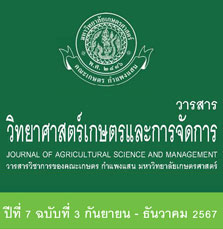Farmers’ Participation in Waste Management of Charoen Tham Community, Khao Khlung Sub-district, Banpong District, Ratchaburi Province
Keywords:
participation, waste management, principle of 3RsAbstract
The purposes of this research were to study 1) general information about household waste management among farmers, 2) waste management processes and the benefits they provide to the community, and 3) farmers’ participation in waste management. The research was conducted with two sample groups: 1) community leaders from a waste-free community project, consisting of 1 person, and 2) participation of farmers from 40 households. Data were collected through interviews and surveys from February to March 2023, and descriptive statistics were used to analyze the data. The research findings reveal that the majority of farmers were females (60.00%), with an average age of 43.70 years, and reside in the area for an average of 26.03 years. The waste found was predominantly organic waste (35.45%). The community's waste management process consists of 1) recognizing waste-related issues, 2) establishing waste management committees, 3) promoting waste separation, 4) building awareness about waste management, 5) providing knowledge training on waste management, and 6) developing learning resources for waste management. The overall results of farmers’ participation in waste management were at a moderate level (average score of 3.01), with farmers’ participation at the highest level of participation in activities (average score of 3.16), followed by participation in evaluating (average score of 3.15), participation in decision-making (average score of 3.05), and, lastly, participation in receiving mutual benefits (average score of 2.59). The research suggests that local authorities should support and encourage both farmers and the younger generation to play a role and participate in waste management processes to develop sustainable waste management practices effectively
References
กรมควบคุมมลพิษ. 2559. แผนแม่บทการบริหารจัดการขยะมูลฝอยของประเทศ (พ.ศ.2559-2564). (ระบบออนไลน์). แหล่งข้อมูล:
https://www.pcd.go.th/publication/5061. (8 สิงหาคม 2565).
กรมควบคุมมลพิษ. 2564. รายงานสถานการณ์มลพิษของประเทศไทยปี 2564. (ระบบออนไลน์). แหล่งข้อมูล:
https://www.pcd.go.th/publication/26626. (15 กันยายน 2565).
กรมส่งเสริมการเกษตร. 2563. การผลิตปุ๋ยจากมูลไส้เดือน. (ระบบออนไลน์). แหล่งข้อมูล: http://aopdh03.doae.go.th/wp-content/uploads/2020/02/AF.pdf. (7 สิงหาคม 2565).
กรมส่งเสริมการปกครองท้องถิ่น. ม.ป.ป. คู่มือประชาชนเรื่องการจัดการขยะในครัวเรือน.(ระบบออนไลน์). แหล่งข้อมูล: Microsoft Word - คู่มือประชาชน เรื่อง การจัดการขยะในครัวเรือน.doc (nongrawiang.go.th) (20 สิงหาคม 2565).
กรมส่งเสริมคุณภาพสิ่งแวดล้อม. 2565. รับสมัครโครงการชุมชนปลอดขยะ (Zero Waste). (ระบบออนไลน์). แหล่งข้อมูล: https://www.greennetworkthailand.com/zero-waste-2566/ (29 ธันวาคม 2565).
พัชรี ไกรแก้ว. 2550. พฤติกรรมการจัดการขยะมูลฝอยในครัวเรือน ของแม่บ้าน กรณีศึกษา: แม่บ้านเขตเทศบาลตำบลบางปู อำเภอเมือง จังหวัดสมุทรปราการ. วิทยานิพนธ์สังคมศาสตรมหาบัณฑิต. มหาวิทยาลัยมหิดล, กรุงเทพมหานคร. 208 หน้า.
ไพบูลย์ แจ่มพงษ์. 2555. การใช้ประโยชน์และการจัดการขยะมูลฝอยของครัวเรือนประชาชน ตำบลสวนหลวง อำเภออัมพวา จังหวัดสมุทรสงคราม. วิทยานิพนธ์อิสระ. มหาวิทยาลัยราชภัฎสวนสุนันทา, กรุงเทพมหานคร. 74 หน้า.
ภฤศยา ปิยนุสรณ์ และ วรรณี สุทธใจดี. 2555. รายงานการวิจัย เรื่อง การศึกษาการเลี้ยงไส้เดือนเชิงพานิชย์ในการจัดการขยะอินทรีย์. ได้รับทุนอุดหนุนจากมหาวิทยาลัยราชภัฎสวนสุนันทา, กรุงเทพมหานคร. 52 หน้า.
วาริญนิศา วิจิตรวงศ์วาน และ วิจิตรา ศรีสอน. 2565. แนวทางในการจัดการขยะมูลฝอยของชุมชนต้นแบบบ้านรางพลับ ตำบลกรับใหญ่ อำเภอบ้านโป่ง จังหวัดราชบุรี ด้วยแนวคิดขยะเหลือศูนย์. วารสารการบริหารนิติบุคคลและนวัตกรรมท้องถิ่น 8(4): 253-267.
วีระศักดิ์ ขำเกิด, วราภรณ์ ทรัพย์รวงทอง และ มยุรี รัตนเสริมพงศ์. 2564. การมีส่วนร่วมในการจัดการขยะมูลฝอยครัวเรือนในเขตเทศบาลเมืองอ่างทอง จังหวัดอ่างทอง. Lawarath Social E-Journal 3(2): 13-30.
สำนักสิ่งแวดล้อม กรุงเทพมหานคร. 2558. คู่มือการคัดแยกขยะและวิธีการทิ้งขยะ. (ระบบออนไลน์). แหล่งข้อมูล: https://webportal.bangkok.go.th/upload/user/00000231/pdf/338-01.pdf. (7 สิงหาคม 2565).






